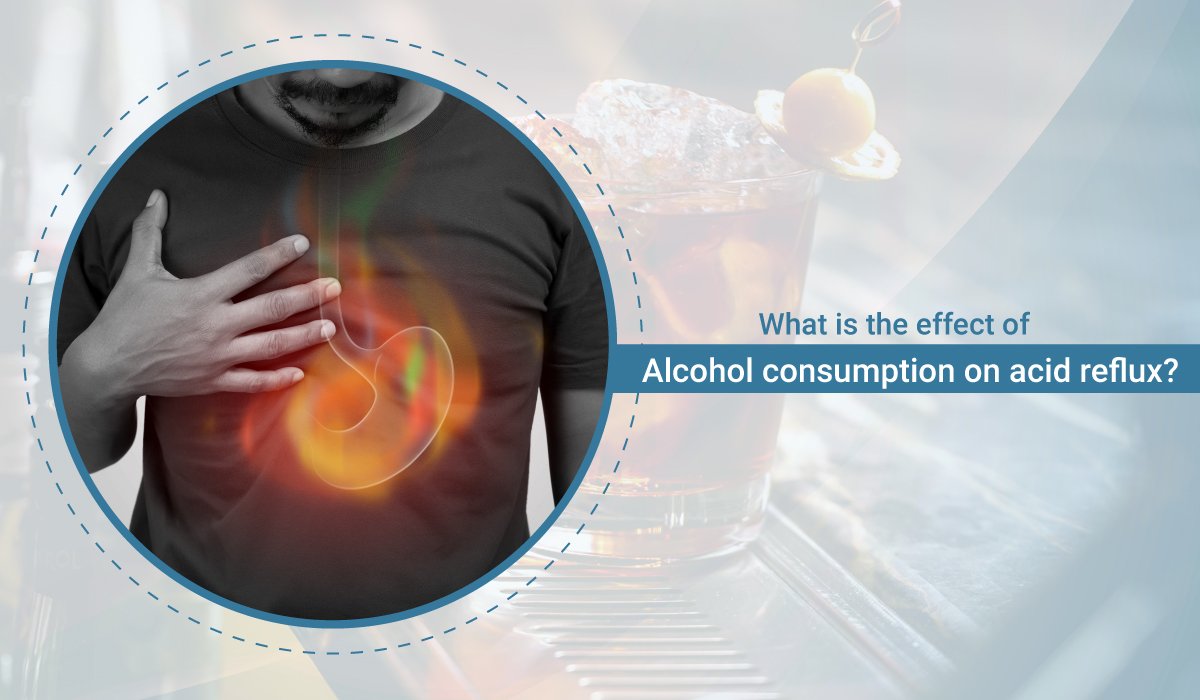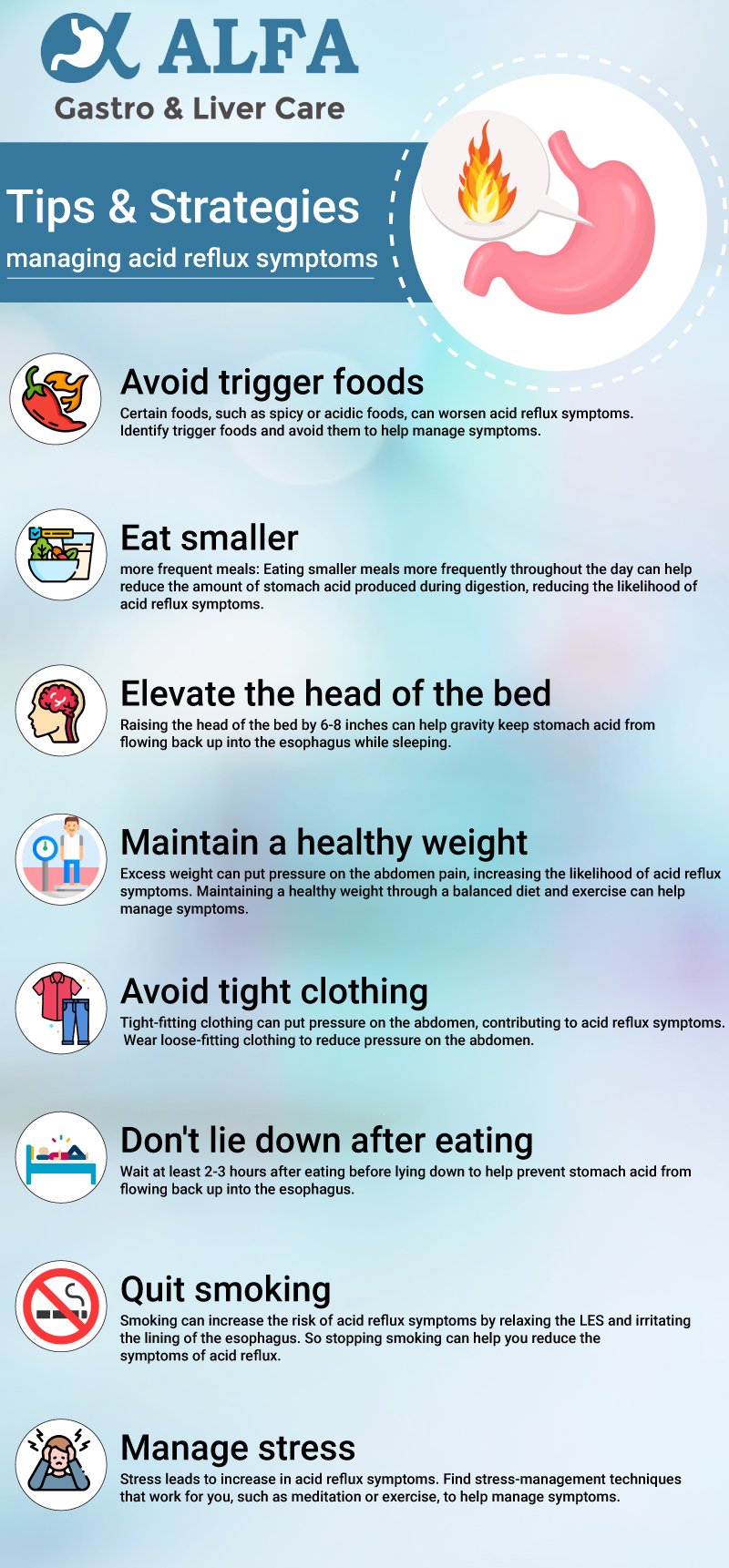What is the effect of alcohol consumption on acid reflux?

Acid reflux, also known as gastroesophageal reflux disease (GERD), is a condition where stomach acid flows back up into the esophagus, causing irritation and discomfort. Common acid reflux symptoms include heartburn, regurgitation of food or liquid, and difficulty swallowing. Acid reflux is often caused by a weakened lower esophageal sphincter (LES), which allows stomach acid to flow back into the esophagus. Other risk factors for acid reflux include obesity, pregnancy, smoking, and certain medications. Treatment options for acid reflux may include lifestyle modifications such as avoiding trigger foods, losing weight, and elevating the head of the bed, as well as medications to lower down the production of acid to prevent damage to the esophagus lining.
What are the links between alcohol consumption and acid reflux?
- Alcohol can weaken the lower esophageal sphincter (LES), which is responsible for preventing stomach acid from flowing back up into the esophagus. When the LES is weakened, stomach acid can easily flow back up and cause acid reflux symptoms.
- Drinking alcohol can also increase the production of stomach acid, further exacerbating acid reflux symptoms.
- Alcohol can also irritate the lining of the esophagus, making it more sensitive to stomach acid and causing additional discomfort.
- Certain types of alcohol, such as wine and beer, have been shown to be more likely to trigger acid reflux symptoms compared to other types of alcohol.
- Heavy alcohol consumption and binge drinking have been linked to an increased risk of developing gastroesophageal reflux disease (GERD), a more severe form of acid reflux.
- While avoiding alcohol altogether may be the best way to manage acid reflux symptoms, limiting alcohol consumption, especially before bedtime, can also be beneficial.
- Treatment options for alcohol-induced acid reflux may include lifestyle modifications such as avoiding trigger foods, losing weight, and elevating the head of the bed, as well as medication.
How much alcohol can trigger or worsen acid reflux?
The amount of alcohol consumption that may trigger or worsen acid reflux symptoms can vary from person to person. However, studies have shown that even moderate alcohol consumption can increase the risk of developing acid reflux and related symptoms. Moderate alcohol consumption is typically defined as one drink per day for women and two drinks per day for men. However, it is important to note that even consuming within these limits can increase the likelihood of experiencing acid reflux symptoms. Additionally, heavy alcohol consumption, such as binge drinking or consuming more than five drinks in one sitting, can significantly increase the risk of developing GERD and other complications. Excessive alcohol consumption can also have other negative effects on the body, such as increasing the risk of liver disease, heart disease, and certain cancers. Therefore, it is recommended that individuals with acid reflux limit their alcohol consumption or avoid it to regulate their symptoms and reduce the risk of developing more severe complications.
Types of alcohol that can worsen acid reflux symptoms?
While any type of alcohol has the potential to trigger acid reflux symptoms, some types may be more likely to worsen symptoms than others. Here are some examples:
- Wine: Both red and white wine have been shown to trigger acid reflux symptoms in some individuals. This may be due to their high levels of acidity, which can irritate the lining of the esophagus and cause discomfort. Additionally, wine may also cause the LES to relax, allowing stomach acid to flow back up into the esophagus.
- Beer: Beer is also a common trigger for acid reflux symptoms, likely due to its high carbonation levels and hop content. These factors can contribute to increased stomach acid production and further aggravate the symptoms of acid reflux.
- Spirits: Hard liquors such as whiskey, vodka, and gin are also potential triggers for acid reflux symptoms. They have high alcohol content and can irritate the lining of the esophagus, leading to discomfort and increased acid production.
While avoiding alcohol altogether is the best way to manage acid reflux symptoms, it may not be realistic for everyone. If someone chooses to drink alcohol, they can consider lower-acid options such as low-acid wines or light beers. They can also limit their intake and avoid drinking on an empty stomach.
Tips and strategies for managing acid reflux symptoms in list

- Avoid trigger foods: Certain foods, such as spicy or acidic foods, can worsen acid reflux symptoms. Identify trigger foods and avoid them to help manage symptoms.
- Eat smaller, more frequent meals: Eating smaller meals more frequently throughout the day can help reduce the amount of stomach acid produced during digestion, reducing the likelihood of acid reflux symptoms.
- Elevate the head of the bed: Raising the head of the bed by 6-8 inches can help gravity keep stomach acid from flowing back up into the esophagus while sleeping.
- Maintain a healthy weight: Excess weight can put pressure on the abdomen pain, increasing the likelihood of acid reflux symptoms. Maintaining a healthy weight through a balanced diet and exercise can help manage symptoms.
- Avoid tight clothing: Tight-fitting clothing can put pressure on the abdomen, contributing to acid reflux symptoms. Wear loose-fitting clothing to reduce pressure on the abdomen.
- Don’t lie down after eating: Wait at least 2-3 hours after eating before lying down to help prevent stomach acid from flowing back up into the esophagus.
- Quit smoking: Smoking can increase the risk of acid reflux symptoms by relaxing the LES and irritating the lining of the esophagus. So stopping smoking can help you reduce the symptoms of acid reflux.
- Manage stress: Stress leads to increase in acid reflux symptoms. Find stress-management techniques that work for you, such as meditation or exercise, to help manage symptoms.
What are the long-term effects of chronic alcohol consumption on acid reflux?
Chronic alcohol consumption can have several long-term effects on acid reflux, including increased risk for gastroesophageal reflux disease (GERD), esophagitis, and Barrett’s esophagus, a condition where the cells in the esophagus change in response to chronic acid exposure, increasing the risk for esophageal cancer. Alcohol can weaken the lower esophageal sphincter (LES), a muscle that acts as a barrier between the stomach and the esophagus, allowing stomach acid to flow back up into the esophagus more easily. Over time, this can lead to chronic inflammation and irritation of the esophagus, causing further damage and complications. Therefore, it is important to limit alcohol consumption and seek medical treatment if experiencing chronic acid reflux symptoms.
Conclusion
In conclusion, the link between alcohol consumption and acid reflux is well-established, and individuals who experience frequent or severe acid reflux symptoms may benefit from limiting or avoiding alcohol altogether. Managing acid reflux symptoms involves identifying trigger foods, eating smaller, more frequent meals, maintaining a healthy weight, and avoiding tight-fitting clothing. Elevating the head of the bed, waiting to lie down after eating, quitting smoking, and managing stress can also help manage symptoms. However, it is important to consult with a healthcare provider for a comprehensive treatment plan that may include medications or other treatments to manage symptoms and prevent complications. For example, Vatsal Mehta, a gastroenterologist, can provide expert guidance on managing acid reflux symptoms and developing an individualized treatment plan to meet the specific needs of each patient. To know more about us, contact Alfa Gastro and Liver care.
